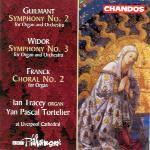Charles-Marie Widor’s Third Symphony for organ and orchestra makes a perfect companion to the famous Saint-Saëns Third for the same forces, and I’m amazed that the two have never been coupled together. Like the earlier work, Widor’s symphony has two movements, though it’s less traditionally structured than the Saint-Saëns and a bit more in the tradition of César Franck. It’s harmonically luscious, magnificently orchestrated, full of good tunes, and certainly a refreshing change of pace. Félix Guilmant’s Second Symphony represents a recasting of one of his solo organ sonatas, and while less adventurous harmonically than the Widor, it’s also a fresh, lively work in a neo-classical vein featuring a couple of especially vivacious fugues. Yan Pascal Tortelier directs performances of both works that are just about perfect, though an earlier version of the Widor available from Motette had the advantage of a more flattering acoustic environment with a deeper bass extension. Chandos copes with the hugely reverberant Liverpool Cathedral very well, with good balances and excellent clarity. While the “filler”, a decent performance of Franck’s Choral No. 2, seems somewhat out of place, it certainly doesn’t detract from enjoyment of this usually interesting and appealing program.
































